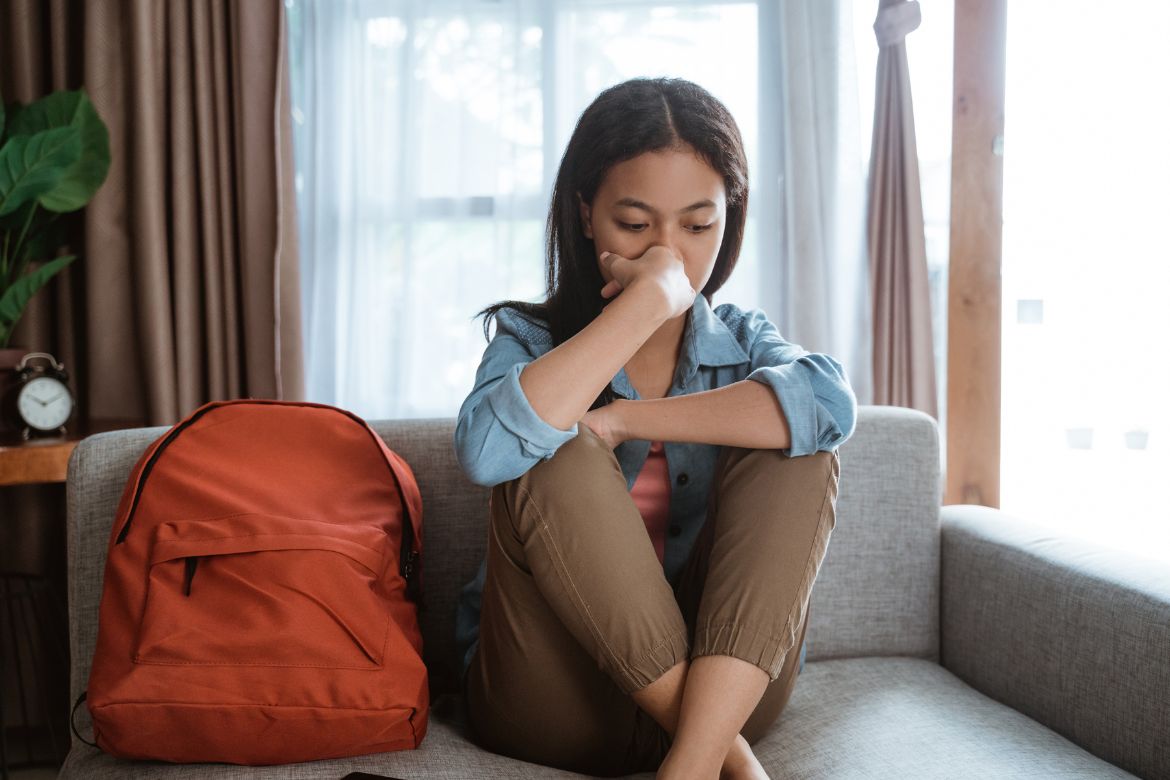Teenagers often have worries and intrusive thoughts that can lead to ongoing anxiety. One of the most common types is Generalized Anxiety. The DSM-V explains Generalized Anxiety Disorder as, “excessive anxiety and worry occurring more days than not for at least 6 months, about a number of events or activities such as work or school performance.” Anxiety can have physical and emotional effects that can feel like an endless burden. As adult mentors, educators, and caregivers, here are tips for how to help a teenager with anxiety.

How to Help a Teenager With Anxiety
Thoughts
The anxious brain is conflicted as the mind can race, but inversely “blank out.” The frustration of not having a clear mind can lead to poor performance in school. Teens can start to lose concentration after school during homework or at work. Validate some of their worried thoughts by using logical thinking such as separating facts from fiction. Encourage creative outlets after mentally draining tasks. Teens can use journaling and stream of consciousness type writing to free these intrusive thoughts. Make sure there is a safe place for creativity as expression can be personal. Respect the privacy of your teen, but encourage them to share if comfortable.
Anger & Tension
Anger and irritability can unfortunately arrive during anxiety as a result of frustration. As we feel tense with worry, our bodies follow suit. Find what works best for your teen in the realm of movement. Sports are an obvious go-to, but yoga, tai chi and even light stretching can help. Giving your teen a time and space to calm down when angry will benefit you both. Talking about the anger when clear headed will improve your connection.
Sleep & Rest
Since one purpose of anxiety is to keep the brain and body on alert, there is a restless component that comes with anxiety. Frequently one can feel hypervigilant, especially when racing thoughts are added.
As a result, teens with anxiety may feel more tired and lethargic. Sleep becomes more crucial as anxiousness is prone to poor sleep patterns. Teenagers also need more sleep than their adult counterparts. Make early mornings less stressful by sticking to a more relaxing “down time” routine before bed. Find what type of nightly routine and sleep schedule works best. Remember that rest isn’t always sleep; meditation and taking breaks when acceptable can refresh the mind. A “mental health day” off school or work when appropriate can rejuvenate the soul.
Feeling Safe
One of Maslow’s hierarchy of needs is a sense of safety. The recent pandemic drastically affected schooling and activities. As a result, teens have had to learn to adapt to change and deal with disappointment. Teens especially crave the consistency of routine. Knowing what to anticipate in advance can help calm the anxious brain. Try to be realistic with expectations and set rules together. If you are uncertain of plans, be honest with your teen and come up with alternatives so that they know what to expect.
Using the 5 senses can be grounding to calm the nerves. For example, making a favorite meal together is comforting and incorporates all senses. Carrying a rollerball scent to smell, a fidget spinner to touch or sour candy to taste can be quick remedies when anxiety starts. Small changes of surroundings can also be refreshing, such as letting your teen rearrange and redecorate their room. There has been a resurgence in sensory items among teenagers. Being playful and letting teens enjoy video games and toys from their younger years also creates a sense of comfort.

Emotional Awareness
There are many disorders that accompany anxious feelings such as Major Depressive Disorder, ADHD, and OCD. Anxiety can also be a result of traumatic events or major life changes.
Social anxiety (social phobia) is common among teens. Based on data from The National Comorbidity Survey Adolescent Supplement (NCS-A), an estimated 9.1% of adolescents have social anxiety disorder, with an estimated 1.3% causing severe impairment.
Therapy for teens with a licensed professional counselor gives space to divulge these complicated thoughts and emotions. Group Therapy for Teenagers is a unique opportunity to gain skills and new behaviors with the benefit of an expert-led experience while being accelerated through the lens of social learning that can only come from peer support. Group formats have been used to successfully manage a variety of mental health disorders such as depression and anxiety.
Remember to practice your own self care when anxious as we are a great influence in their lives. When children see us coping better, they experience positive results firsthand. Normalizing honest conversations about emotions will show teens how to develop into healthy adults.
Written by Rachel Taylor, LPC. Rachel is accepting patients at our Monroeville location as well as online. She is leading Group Therapy for Teenagers: Teen Art Group.
Sources:
American Psychiatric Association. (2013). Diagnostic and statistical manual of mental disorders (5th ed.)
Maslow, A. H. (1954). Motivation and personality ([1st ed.].). New York: Harper.
National Institute of Mental Health. (2021). Social Anxiety Disorder. Retrieved from: https://www.nimh.nih.gov/health/statistics/social-anxiety-disorder
Related Posts
Generalized Anxiety Therapy
Generalized Anxiety Generalized anxiety disorder is a mental health concern...
Our Therapists’ Personal Tips for How They Avoid Burnout
American Counseling Association has dedicated April as Counseling Awareness...


